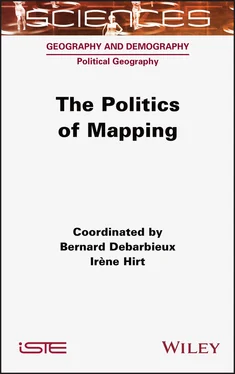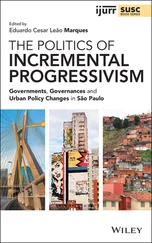1 Cover
2 Title Page SCIENCES Geography and Demography, Field Director – Denise Pumain Political Geography , Subject Head – Frédéric Giraut
3 Copyright First published 2022 in Great Britain and the United States by ISTE Ltd and John Wiley & Sons, Inc. Apart from any fair dealing for the purposes of research or private study, or criticism or review, as permitted under the Copyright, Designs and Patents Act 1988, this publication may only be reproduced, stored or transmitted, in any form or by any means, with the prior permission in writing of the publishers, or in the case of reprographic reproduction in accordance with the terms and licenses issued by the CLA. Enquiries concerning reproduction outside these terms should be sent to the publishers at the undermentioned address: ISTE Ltd 27-37 St George’s Road London SW19 4EU UK www.iste.co.uk John Wiley & Sons, Inc. 111 River Street Hoboken, NJ 07030 USA www.wiley.com © ISTE Ltd 2022 The rights of Bernard Debarbieux and Irène Hirt to be identified as the authors of this work have been asserted by them in accordance with the Copyright, Designs and Patents Act 1988. Any opinions, findings, and conclusions or recommendations expressed in this material are those of the author(s), contributor(s) or editor(s) and do not necessarily reflect the views of ISTE Group. Library of Congress Control Number: 2021951707 British Library Cataloguing-in-Publication Data A CIP record for this book is available from the British Library ISBN 978-1-78945-067-5 ERC code: SH2 Institutions, Values, Environment and Space SH2_1 Political systems, governance SH2_11 Human, economic and social geography SH2_12 GIS, spatial analysis; big data in political, geographical and legal studies
4 Introduction Introduction Bernard DEBARBIEUX and Irène HIRT University of Geneva, Switzerland
I.1. Theoretical and conceptual debates I.1. Theoretical and conceptual debates The focus on the relationship between mapping 1 , on the one hand, and politics or power, on the other hand, is certainly not new, or even recent. For centuries, particularly in the Christian, Chinese and Arab-Muslim worlds, the people who commissioned maps (princes, ministers or heads of state) and the cartographers clearly believed that maps must, first and foremost, serve the objectives of knowledge and the control of territories by sovereigns, armies and state administrations. In the Western world, the proximity between maps and political power became less visible around the 18th century, when the discourse among cartographers began to focus on the techniques of production, the accuracy of the representation and the scientific value of the knowledge produced. This shift became even more pronounced in the 20th century when the scientific analysis of the map corpus and reflection on map production itself became essentially guided by a belief in the progress of techniques and knowledge. This led to the triumph of verism in the representation of the Earth’s surface, accuracy in the representation of data and optimization in the communication of knowledge. This threefold objective was achieved through the increasing sophistication of modern societies, techniques and policies. A few key figures in cartographic thinking in the second half of the 20th century embodied this ambition. Among these figures, Bertin (1983 [1967]) reflected on the visual and semiological effectiveness of maps. However, from the 18th to the 20th centuries, this discourse on the efficiency of maps was often voiced by authors working directly or indirectly for political authorities, sometimes even within their institutions. The added value maps held for the exercise of power tended to escape critical reflection, since it became consubstantial with cartographic knowledge, on the one hand, and with government know-how, on the other hand.
I.2. Political practices and uses of maps I.2. Political practices and uses of maps The second objective of this collective work is to point out a series of social and technical transformations that force us to move away from the implicit equivalence between mapping, power and the state. In addition to the fact that the political analysis of societies has, on the whole, become detached from a vision centered on the state, fundamental social transformations have taken place over the last few decades in the production and use of maps and geographical information.
I.3. The structure of this book I.4. References
5 1 The Map as a Legitimate Space: Cartography as a Language, a Stage and an Issue 1.1. Introduction 1.2. Map truth regimes 1.3. The new spaces of the electoral map 1.4. Cartographic turn, geographic turn and political space 1.5. Ethical turn and mapping 1.6. Mapping, citizen science 1.7. References
6 2 Cartography and Spatial Production of Society 2.1. The map, politics and morality 2.2. The map, territory and globe 2.3. The map, order and modernity 2.4. The map, reason and rhetoric… 2.5. The map, constraint and the self-organization… 2.6. The map, production and society 2.7. References
7 3 Farewell to Maps: Reformulating Critical Cartography in the Digital Age 3.1. Introduction 3.2. Farewell to maps: when the digital world disrupts the objects and questions of a research current 3.3. The shortcomings of critical mapping exacerbated by digital technology 3.4. Reformulating critical mapping in the digital age 3.5. Conclusion 3.6. References
8 4 Mapping and Participation in the Topos and Chora Test 4.1. Introduction 4.2. Participatory mapping tested by topos and chora 4.3. Toward a reflective approach to participatory mapping 4.4. From solicited mapping to collaborative systems and digital traces 4.5. The new boundaries of collaborative mapping systems produced by geolocation technologies 4.6. Representing the spatiotemporal dimension of urban mobility using data produced by inhabitants 4.7. Toward a reflective and chorographic approach to collaborative mapping systems 4.8. Conclusion 4.9. References
9 5 The Cartographic Factory of Modern States 5.1. Introduction 5.2. The invention of spatial modernity in the Renaissance 5.3. State imaginaries of space and territory 5.4. The construction of the nation-state through the map 5.5. The colonial adventure: a counter-illustration? 5.6. Maps and the government of things and people 5.7. Current state of the issue 5.8. References
10 6 Statistical Cartography and International Governance in the Age of Big Data 6.1. Introduction 6.2. Birth and internationalization of statistical cartography 6.3. International statistical mapping 6.4. Cartography in the digital age 6.5. Mapping the SDGs 6.6. (Re)configurations of international cartography 6.7. Conclusion 6.8. References
11 7 Indigenous Mapping: Reclaiming Territories, Decolonizing Knowledge 7.1. Introduction 7.2. Conceptual and theoretical milestones 7.3. Using maps to claim rights and reclaim territories 7.4. Decolonizing maps and cartography 7.5. Conclusion 7.6. References
12 8 Chorematic Representations in Participatory Processes of Territorial Projects 8.1. Introduction 8.2. Methodological choices 8.3. Three illustrations of the use of choremes in territorial projects 8.4. How can we evaluate this co-construction of territories? 8.5. References
13 9 National Territorial Prospective Maps 9.1. Introduction 9.2. DATAR, foresight and mapping 9.3. The Paris Basin White Paper 9.4. The first maps of the great national debate on regional planning 9.5. France in 2015 9.6. France in 2020 9.7. Lessons from a wealth of experience 9.8. References
14 10 Making Maps to Fight Unjust Migration Policies 10.1. Introduction 10.2. Actors and objectives of cartographic productions 10.3. Mapping experiments undertaken 10.4. Conclusion 10.5. References
Читать дальше












